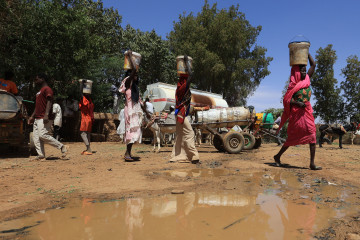

Recent developments in Sudan provide little obvious reason for optimism. In the year and a half since a coup d’état cemented the military’s control of the country, Sudan’s leadership has struggled to reintegrate into the international community and meet the needs of its citizens.
Just last month, Western world powers threatened to continue withholding economic aid until the country returns to the stewardship of a civil government.
All the while, climate change is battering Sudan, transforming the capital of Khartoum into one of the hottest cities on Earth.
"The combination of education and representation has provided female agricultural workers in rural areas, one of Sudan’s more marginalized communities, with tools to withstand the most immediate effects of climate change as desertification and water scarcity grow worse"
Sudan’s rural areas, like its beleaguered capital, are contending with global warming. Out in the countryside, however, women are taking the lead in adapting to Sudan’s changing environment.
In February, the United Nations Environment Program spotlighted its work with Sudan’s “women fighting back” against water scarcity. The U.N.’s most important allies in this initiative, female farmers, are serving on the front lines of the battle to contain the climate crisis.
The U.N. Environment Program partnered with the Sudanese Higher Council for Environment and Natural Resources, a government agency, to assist 43 rural communities throughout Sudan’s drought-plagued White Nile state while the Global Environment Facility bankrolled the project.
The U.N. credited the years-long initiative with having “empowered thousands of women by helping them choose from a range of climate adaptation techniques, including more than 1,000 women who were trained how to grow vegetables in tough climatic conditions.”
In addition to overseeing the training, the Higher Council for Environment and Natural Resources launched councils throughout White Nile where women had a guaranteed number of seats.
This combination of education and representation has provided female agricultural workers in rural areas, one of Sudan’s more marginalized communities, with tools to withstand the most immediate effects of climate change as desertification and water scarcity grow worse.
Sudanese officials have recognized the threat posed by these twin environmental issues for decades. A 2006 report by the Sudanese Ministry of Agriculture and Forestry called Sudan the “most seriously affected country by desertification in Africa” and noted that it had “been severely affected by recurrent drought spells” since the 1970s.
In more recent years, farmers and pastoralists, whom the U.N. Environment Program put at “almost two-thirds of rural Sudanese,” have been abandoning their livelihoods because of the challenges created by desertification.
Given the danger that global warming portends for Sudan’s agriculture and the wider economy, the country will likely continue to seek the international community's support.
The 2006 report asserted, “Sudan is a poor country and there is a need for a significant amount [sic] of external assistance to achieve the national development objectives.” The report added that, even then, the country was relying on the U.N. to back its anti-desertification work in rural areas.
While Sudan’s politics grew more tumultuous in the last few years, the U.N.’s work in Sudan’s rural areas hardly slowed. The U.N. has even maintained its projects in the country’s most sensitive locations.
Just last year, the U.N. Environment Program highlighted an initiative to train female agricultural workers in Darfur, a region that became synonymous with genocide after the military’s brutal campaign against separatists there in the early 2000s. Like its White Nile counterpart, that project saw the U.N. Environment Program coordinate with Sudanese officials.
|
Despite the promise of these collaborations, wider-scale partnerships between Sudan and the international community will remain challenging under the country’s current military government.
While the U.N. scheme in Darfur received funding from the European Union, Western leaders have signalled their reluctance to offer assistance outside immediate humanitarian aid to a country governed by generals accused of war crimes in Darfur.
The U.N., for its part, has taken a similar stand. On March 3, U.N. High Commissioner for Human Rights Volker Türk called for the “restoration of civilian rule and the transition to democracy” in Sudan. He also lamented a crackdown on post-coup dissent that has led to at least 9,096 injuries and 125 deaths, which include the February 28 shooting of a teenager by a police officer in Khartoum.
Though the U.N.’s engagement with Sudanese government agencies on environmental issues will likely persist, the military government’s hostility to freedom of expression will dampen any Western enthusiasm for bigger projects.
As the international community debates how best to assist Sudan without normalizing its leadership, Sudanese women in rural areas will be using the U.N. Environment Program's teachings.
Depending on the long-term success of the initiatives in Darfur and White Nile, the international community may even look to them as role models for other developing countries beset by desertification and water scarcity.
In the meantime, Sudan’s female farmers will be demonstrating to their own rural communities that women’s empowerment can go hand in hand with climate change mitigation.
Austin Bodetti is a writer specialising in the Arab world. His work has appeared in The Daily Beast, USA Today, Vox, and Wired
![A Sudanese woman fills water bottles held by a young boy about 60 kilometres north of El-Fasher, the capital of the North Darfur state [Getty Images]](/sites/default/files/styles/medium_16_9/public/2023-03/GettyImages-634410354%20%281%29.jpg?h=f52a926c&itok=5m1xSiPv)



 Follow the Middle East's top stories in English at The New Arab on Google News
Follow the Middle East's top stories in English at The New Arab on Google News


